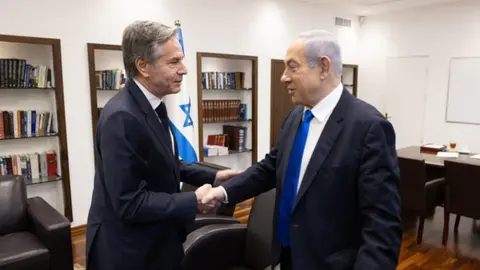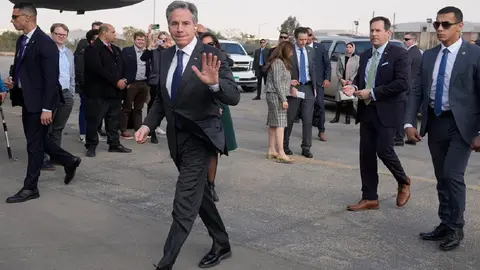Netanyahu rejects Hamas conditions, insists on outright victory

Israel's Prime Minister Benjamin Netanyahu has rejected Hamas' latest proposal for a ceasefire agreement that would also see the release of the hostages still held in the Gaza Strip. Four months into the war between the terrorist group and Israel, Netanyahu continues to insist on "absolute victory", claiming that the conflict will be settled in "a matter of months" rather than years.
- Israel insists on demilitarising Gaza, 'replacing' UNRWA
- At least 32 hostages have been killed in Gaza
Netanyahu has branded Hamas's conditions for a deal as "delusional demands", saying they "would not achieve freedom for the hostages, but invite further slaughter". "They would invite a disaster for Israel that no Israeli citizen wants," he said.
Hamas' proposals include a four-and-a-half-month truce during which the hostages would be released in three stages leading to the end of the war, Reuters reports. The terrorist organisation also demanded the release of Palestinian prisoners in Israeli jails on terrorism-related charges.
However, Netanyahu stressed that the return of the kidnapped Israelis remains the top priority, saying that "continued military pressure is an essential condition for the release of the hostages".
The Chief of Staff of the Israel Defence Forces, Herzi Halevi, has expressed himself in a similar vein, asserting that the release of the hostages will not be possible without military pressure.
This strategy and its achievements - "unprecedented, according to Netanyahu - have already led to the elimination of 20,000 Hamas fighters, as well as the dismantling of 18 of its 24 battalions. Meanwhile, following the fighting in the north, Israeli troops are in Khan Younis, the main Hamas stronghold in Gaza, and will move on to Rafah, according to the Prime Minister.
Total victory 🇮🇱 pic.twitter.com/Q3Dz6ltH4f
— Benjamin Netanyahu - בנימין נתניהו (@netanyahu) February 7, 2024
The move, according to UN Secretary-General Antonio Guterres, "will exponentially increase what is already a humanitarian nightmare with incalculable regional consequences".
In Rafah, half of the enclave's 2.3 million inhabitants are locked in along the border with Egypt, according to Reuters. The Hamas-controlled Gazan authorities have reported Israeli air strikes in the area. One such strike killed a senior Palestinian police officer and Hamas member Majdi Abdel-Al.
As the war in Gaza encroaches further into Rafah, I am extremely concerned about the safety and well-being of families which have endured the unthinkable in search of safety.https://t.co/nUozER45Ho pic.twitter.com/DdMM9HPlBS
— Martin Griffiths (@UNReliefChief) February 7, 2024
Israel insists on demilitarising Gaza, 'replacing' UNRWA
Netanyahu's remarks come amid a new visit to Israel by US Secretary of State Antony Blinken. During their meeting, the Israeli leader insisted that once Hamas is destroyed in Gaza, Israel will "guarantee" that the enclave will be "demilitarised forever".
The United States, for its part, hopes that once the war is over, the Palestinian Authority, together with several regional countries such as Saudi Arabia and the United Arab Emirates, will administer Gaza. Washington also stresses the need for a diplomatic path towards peace and security for Israel, as well as a Palestinian state.
I met with Palestinian Authority (PA) President Abbas in Ramallah today to reiterate U.S. support for reforming the PA and establishing an independent Palestinian state. pic.twitter.com/9Gi5QMRihH
— Secretary Antony Blinken (@SecBlinken) February 7, 2024
Regarding Netanyahu's recent rejection of Hamas's demands, Blinken assured that, despite "some clear failures", there is still "room to reach an agreement".
During their meeting they also discussed the recent controversy over UNRWA, the UN agency for Palestinian refugees, which, according to Jerusalem, is closely linked to Hamas.
These allegations are based on evidence that at least 12 members of UNRWA in Gaza were involved in the 7 October massacres. Of these dozen, seven were primary or secondary school teachers, including two mathematics teachers and two Arabic language teachers.
Seven years ago, we sent warnings to UNRWA estimating that thousands of their employees were implicated in terrorism.
— Hillel Neuer (@HillelNeuer) February 7, 2024
They did nothing. Worse, UNRWA attacked us.
Last week it was revealed in the WSJ that in Gaza alone, 1,200 UNRWA staffers belong to Hamas or Islamic Jihad. pic.twitter.com/p5vyY5hfo7
Israel believes that 10% of all UNRWA employees are linked to Hamas, while intelligence estimates shared with the US conclude that around 1,200 of the association's approximately 12,000 employees in Gaza have links to Hamas or Palestinian Islamic Jihad. In addition, about half have close relatives who belong to Islamist groups.
For this reason, a number of countries have stopped funding the UN organisation, while Israel believes it needs to be "replaced".
Just a few bad apples?
— Israel in Singapore 🎗️ (@IsraelinSG) February 4, 2024
Here is a saved copy of the UNRWA Telegram group of 3,000 UNRWA teachers: https://t.co/KgFLlrTId1
There are 249,000 messages, replete with celebrations of Hamas terrorism: https://t.co/tCHIXT7QoV
There is NOT one case where an UNRWA teacher objected.… pic.twitter.com/nSmCl7JwGy
At least 32 hostages have been killed in Gaza
Four months after the Hamas attack that left 1,200 dead and more than 200 hostages - many of whom were released in a temporary truce in November - Israeli intelligence has concluded that at least 32 of the more than 130 hostages still in Gaza have died while in captivity.
In addition to the 32 confirmed deaths, the IDF is assessing the possibility that at least 20 more hostages may have been killed.
Four Months! A month,
— Bring Them Home Now (@bringhomenow) February 7, 2024
And another month
And another month
And another month.
124 days without them
Bring them home, NOW! pic.twitter.com/mP2beVRQ1D
So far, the Israeli military authorities have notified the families of 31 hostages who have been confirmed killed. These include 29 hostages kidnapped on 7 October and soldiers Oron Shaul and Hadar Goldin, who were killed by Hamas in 2014 and whose bodies remain in Gaza.










